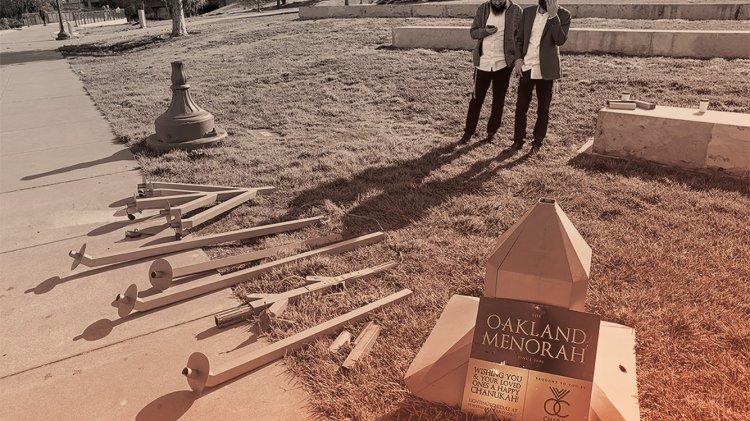How Anti-Semitism Threatens American Democracy
A conversation with Franklin Foer about our April cover story

This is an edition of The Atlantic Daily, a newsletter that guides you through the biggest stories of the day, helps you discover new ideas, and recommends the best in culture. Sign up for it here.
In our April cover story, my colleague Franklin Foer explores how anti-Semitism on both the right and the left threatens to end a period of unprecedented safety and prosperity for American Jews—and the liberal order they helped establish. Frank and I chatted last week about the past and future of anti-Semitism, and about some lesser-understood moments in American Jewish history.
First, here are four new stories from The Atlantic:
- The Supreme Court once again reveals the fraud of originalism, Adam Serwer argues.
- The Supreme Court is not up to the challenge.
- Where did evangelicals go wrong?
- What is going on with Europe’s economy?
What Liberalism Did
Isabel Fattal: You write that “part of the reason I failed to appreciate the extent of the anti-Semitism on the left is that I assumed its criticisms of the Israeli government were, at bottom, a harsher version of my own.” How did October 7 change this thinking for you?
Franklin Foer: For a long time, I didn’t actually think that anti-Semitism was an American problem. And then Donald Trump happens, and it’s clear that he’s given this green light to white supremacists who existed in the dark alleyways of American life. Suddenly anti-Semitism starts to become something that’s much more present, much more socially acceptable in America.
But I had assumed that it was more menacing in its right-wing form than its left-wing form, in part because so much of the debate on the left has been about Israel, and it’s easy to bracket that off into an entirely separate conversation: They’re trying to end an occupation; they want to end what is objectively oppressive treatment of Palestinians.
But then, on October 7, it became painfully clear that there are critics of Israel who don’t believe in peaceful coexistence. A far larger swath of the left than I imagined seemed to want to see the disappearance of the state of Israel. I was also noticing the way in which Zionism became a ubiquitous term of derision in left-wing discourse. It was pretty clear that it was often being used as a synonym for Jew.
Isabel: You write that “anti-Semitism itself entails an accusation of privilege.” Can you talk a bit about how the idea of privilege has always been an element of anti-Semitic theorizing?
Frank: As a concept, anti-Semitism has a tendency to break people’s brain, because it just falls outside of every single taxonomy we use to describe racial and ethnic hatred. We’re used to understanding racism as a power dynamic—oppressors and the oppressed. But anti-Semitism is something very different. It’s an accusation that a secret cabal of people has obtained power by nefarious means and is pulling the strings. It’s exactly what people end up saying on campus all the time. Oh, we’re being shut down because of the donors. Oh, the Zionists control the universities; the Zionists control the media. They’re not saying Jew, but they might as well be. It’s the same old hideous tropes.
Isabel: Jews do hold power in American life and politics today, but there’s another way to have that conversation, isn’t there?
Frank: Right. There’s a way to have that discussion without having to deploy all of the nasty stereotypes, and without turning it into a conspiratorial accusation. Part of my piece is making the argument that American Jewish success is this incredible historical anomaly. Jews have risen to places of incredible power in American politics, society, and institutions. But that’s not a conspiracy. It’s a happy fact of living in a country where ancient stereotypes and blood-and-soil nationalism haven’t ruled the society.
Isabel: Your story explores the idea that liberalism was co-authored and championed by Jewish Americans. Can you speak a bit about that heritage?
Frank: One of the things I wasn’t able to really get into in the piece is that the connection between Jews and liberalism goes back even before they came to America. When Jews were emancipated in Europe, the arrival of liberalism allowed Jews to escape the ghetto and to participate in society as something close to full citizens.
And then you get to America, where Jews were able to do even better with liberalism than they had in Europe, because in Europe there was always this devil’s bargain: If you wanted to participate in France, you had to do it as a Frenchman. You couldn’t do it as a Jewish French person. One of the things that made this country so extraordinary was that you could participate as an American citizen and you didn’t have to give up your identity. That was what emerged in the 20th century, and it was an idea that Jews helped refine and then introduce to the rest of the world.
Isabel: Right, and then you have Jews engaging in the civil-rights movement of the 1960s, sharing common cause with other Americans.
Frank: I grew up in a Jewish world where this became almost mythological—the idea of Rabbi Abraham Joshua Heschel wearing his yarmulke and marching next to Martin Luther King Jr.
Isabel: How did this relationship between American Jews and the American left start to rupture?
Frank: Just after the founding of the state of Israel in 1948, there was this broad sense that Israel was an underdog country. It was actually a liberal cause for a lot of that period: Because of anti-Semitism, progressives fervently believed that there should be a haven for this people who just escaped the Holocaust. Then the Six-Day War happens and Israel conquers territory filled with Palestinian refugees. Israel then suddenly gets cast as a colonial oppressor.
Other things are happening simultaneously. Above all, liberalism has also started to ebb as the dominant force in institutional life. In fact, liberalism is now under assault from both the illiberal left and the MAGA right. That’s the other main strand of the story. As liberalism has receded, anti-Semitism has begun to sprout. Liberalism, it turns out, was pretty effective at tamping down the hatred of Jews.
Isabel: Is there anything else you’d like to say to readers of this story?
Frank: I think one fair question that could be asked of the story is, is its conclusion a little bit too alarmist? I obviously can’t say exactly where things are going. Just because this is no longer a golden age doesn’t mean that we’re on the road to Nazi Germany. There are lots of other stops in between, and most of Jewish history doesn’t consist of golden ages. Ubiquitous anti-Semitism is what constitutes normal existence for much of Jewish history. Jews could still be incredibly influential and successful and can enjoy a lot of the benefits of American life while not living in a golden age.
Isabel: You’re speaking relatively to this anomalous blip in Jewish history.
Frank: Exactly.
Related:
- The Golden Age of American Jews is ending.
- Why the most educated people in America fall for anti-Semitic lies
Today’s News
- The Supreme Court decided unanimously that states cannot bar Donald Trump from running for a second term, after the Colorado Supreme Court had ruled that he was disqualified from holding office again on the basis of the Fourteenth Amendment.
- A team of United Nations experts found what they called “reasonable grounds to believe” that victims were sexually assaulted in Hamas’s October 7 attack.
- Allen H. Weisselberg, the former chief financial officer of the Trump Organization, pleaded guilty to felony perjury charges.
Evening Read
It’s Time to Give Up on Email
By Ian Bogost
You got a new credit card, maybe, or signed up for a food-delivery service. Let the emailing begin. First there’s one to verify your new account, then a message to confirm that you’ve verified your new account, then an offer for an upgrade or a discount. A service I recently started using sent four emails for a single activity, counting log-in notices, confirmations, receipts, and confirmations of the confirmations. Workday, the software that manages HR and payroll for my office, emailed me an alert to approve the hours I had already approved. Online retailers seem to send at least three logistical emails for every order—when it’s placed, when it’s shipped, and when it’s been delivered. Then they send a handful more: a customer-satisfaction survey, a nag to fill out a customer-satisfaction survey, a thank-you for filling out a customer-satisfaction survey.
Also in your inbox: All of the email you get that is, you know, actually related to your job, your interests, or your personal life. Forget reading or responding; even just finding those messages amid the junk can be a chore. Email has felt overwhelming for a long time now, with all of its spam and scams and discount codes. But what used to be a vexatious burden is now a source of daily torment. Email cannot be reformed. Email cannot be defeated. Email can only be forsaken.
More From The Atlantic
- Other presidents have retired in March of their reelection year.
- The meditation start-up that’s selling bliss on demand
- America’s last Morse-code station
Culture Break
Read. “Tomato and Lettuce,” a new poem by Monica Rico.
Then, everything was garnish / two kids and a house, / a wife who kept the // beds made, shirts ironed / secrets hidden like dust // on the canned goods.”
Watch. Julio Torres’s existential comedy Problemista, in theaters, is a marvelous mixture of surrealism and social satire.
When you buy a book using a link in this newsletter, we receive a commission. Thank you for supporting The Atlantic.
What's Your Reaction?




















